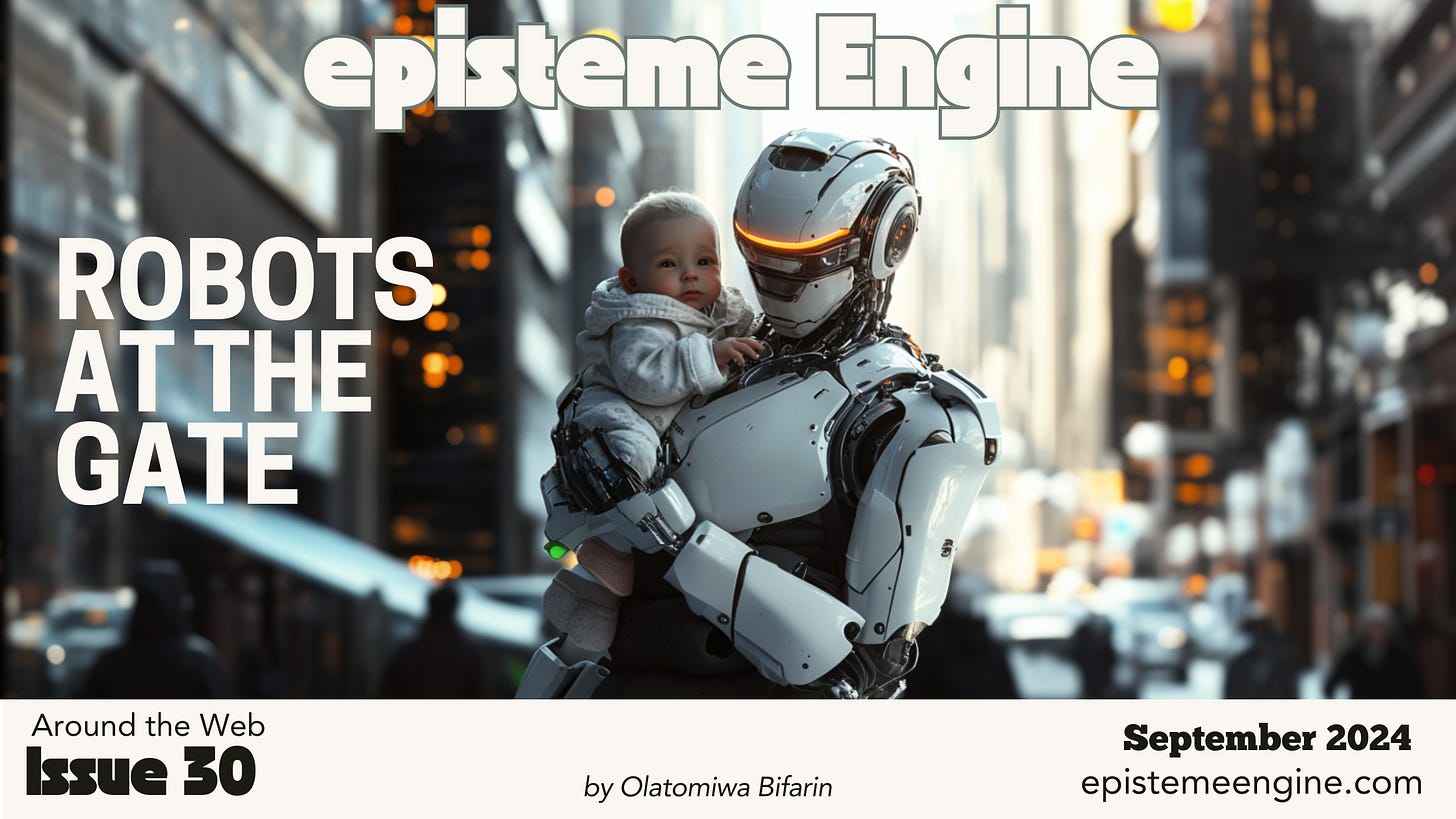Check out my latest AI newsletter: ε Pulse: Issue #16
Watch my latest short video essay: how dopamine destroys life.
[Talking Points]
📱Phone case market projected to reach $44.5 billion by 2033 (who would have thought?).
🩸3D printed blood vessels
🧓🏽Biomolecular markers show major aging ‘events’ at age 44 and 60.
🗝Antikythera mechanism: an ancient Greek computer.
👨💻Human Developers Will Soon Be a Thing of the Past
👨💻AI assistants save Amazon 4,500 years in development.
🫁World-First Lung Cancer Vaccine Trials.
💎World’s second-largest diamond discovered in Botswana.
[Longer Reads/Watch]
[I]: 🦾Robots at The Gate.
I have been running into these autonomous food delivery robots on my run around campus.
Looks like we have entered the age of robots, some unsolicited take on Robots:
We will have humanoid robots roaming about like this in the next decade at most, from my little research, Figure/Tesla seems to be leading the pack, and much work is been done in China (see below)
They will most likely help address labor shortages with the aging population especially in the West.
They will be terribly useful for exploring extreme environments (for new discoveries), think deep ocean floors, volcanic environment, radioactive site, space, caves etc.
We will have non-stereotypical forms of robots, that are highly efficient for specific environment, think an amoebic robot mopping up your spilled coffee on the floor ☕️ Brave new world!
Job displacement is a given, what will happen afterwards, I do not know, actually I can guess: political unrest, xenophobia will spike! because why? Economic disruption.
Some more interesting stories/podcast
Atlas robot from Boston Dynamics doing push ups.
Fully autonomous ice cream shop: Dream Cream.
China-based robotics startup Agibot is set to start mass-producing humanoid robots by the end of 2024.
Skyscraper window-washing robots are here: they can clean windows three times faster than humans.
[II]: 👩🏭Job: Big Tech Doesn't Want You Anymore
What are the reasons behind the recent layoffs in Big Tech? In this quite detailed video essay, the speaker gives reasons many folks wouldn’t argue with: First, Big Tech companies over-hired during the pandemic boom and now they are going through a period of reshuffling their resources. Second, big Tech companies are making significant investments in new areas such as generative AI and cutting staff to improve their bottom line. Third, there might be a decline in demand for workers in ESG (Environmental, Social, and Governance) areas as companies are cutting costs. In the final analysis, the tech industry is cyclical and workers should be aware of that.
[III]: 🧬Unraveling the Origin of Life
Here, Peter Robinson of Hoover Institution interviews two guests: Steven Meyer, a philosopher of science, and James Tour, a chemist. Meyer argues that the origin of life is a mystery that cannot be explained by Darwinian evolution. He believes that the complexity of life suggests that it must have been designed by an intelligent being. Tour agrees with Meyer that the origin of life is a difficult problem to solve. Both Meyer and Tour criticize the scientific community for not being more open to the possibility that life was designed. They believe that there is a bias against intelligent design in science. However, they do diverge. The divergence isn’t particularly coherent on Tour’s part. Whilst Meyer is consistent with his argument of an intelligent designer, Tour position isn’t particularly clear, but later clarified the inconsistency (my definition) for pragmatic reasons. But in general, I agree with the overarching message, essentially where they converge - scientists are blatantly biased on this topic, to the point of being dogmatic. Prof John Lennox has great books on this subject.
[IV]: 🎭Shakespeare's Life, Work, and Religiosity.
Probably beyond words like Hamlet and Romeo & Juliet, I don’t think I know anything else about Shakespeare, so I was eager to jump on this interesting long podcast with Aaron Urbanczyck, a professor of English literature. The main theme of the podcast episode is that Shakespeare is a literary genius if not one of the greatest geniuses full stop. Shakespeare was very inventive with words and the English language, except that most of his words like many of that era are terribly difficult to read. Plus translating his works into other languages is equally difficult because it's nearly impossible to capture the original meaning and nuances.
[V]: 👔AI Friend Necklace.
“Do you ever find yourself speaking to Alexa or Siri just to have someone to talk to? Then you might be the right audience for an upcoming AI-powered necklace called friend (lowercase "F" is their style), an always-listening pendant. The $99 necklace can't turn your lights on and off or Google things for you like Alexa can. Its aim is to keep you company if you're lonely.
Friend also don't speak back to you via an AI voice, like Amazon's Alexa. Instead, you tap your pendant to start the conversation, and it responds via text.”
See the product’s trailer, it’s really something. These kinds of gadgets are primed to do crazy things like identify predictive markers of conflict between partners, for example. All you do is just to get the embedding for conversation at night say, and see how it drifts over time. Brave new world!
[VI]: 🔍Quest to Learn Everything with AI
This podcast talks about how AI is being used in creative ways to improve reading comprehension and workflow efficiency. The guest Dwarkesh Patel, who hosts a popular podcast, leverages Claude’s 3.5 sonnet to understand the key ideas and concepts from difficult texts he reads. He finds this especially helpful when preparing for interviews with experts in complex fields. I switched from chatGPT to Claude myself a few months ago, such a powerful chatbot.
In the same vein, here is also a demo of chatgpt’s advanced voice mode for reading books, so many use cases here as you read: getting context on historical figures or terms, understanding scientific concepts, preparing for what you're about to read, and finding opposing viewpoints.
[VII]: 👵🏼Current State of Longevity research
In this essay, Abhishaike Mahajan explores the current state of longevity research, focusing on several key areas that have seen significant developments or changes since 2021. He discusses the trajectory of sirtuin-focused therapies, which initially showed promise but have since been found to have limited impact on longevity. Mahajan also examines the progress made by longevity-focused research institutions and startups, noting that while it's too early to see significant results, the ambitious nature of their research is promising. Additionally, he delves into the field of cellular reprogramming, highlighting some encouraging animal studies and the progress of companies like Turn Biotechnologies in bringing treatments closer to clinical trials.
Furthermore, Mahajan analyzes the state of biological clocks, which are methods used to predict an individual's biological age. He explains various approaches, including epigenetic clocks, telomere length measurements, and emerging methods based on transcriptomics and proteomics. While discussing each method's strengths and limitations, Mahajan emphasizes that the interpretation of these biological clocks is complex and that their correlation with actual age-related physiological dysfunction is not always straightforward. Overall, he concludes that while progress has been made in several areas of longevity research, there is still much work to be done, and caution is advised for consumers considering biological age testing.
[Books 📚]
Book(s) recently completed:
Brave New Words [Review]
What I am currently reading:
The Master and His Emissary (Still slowly going through the book, I will probably take months to read it. It’s bloody dense)
Development in Progress, by The Consilience Project, PDF available here





